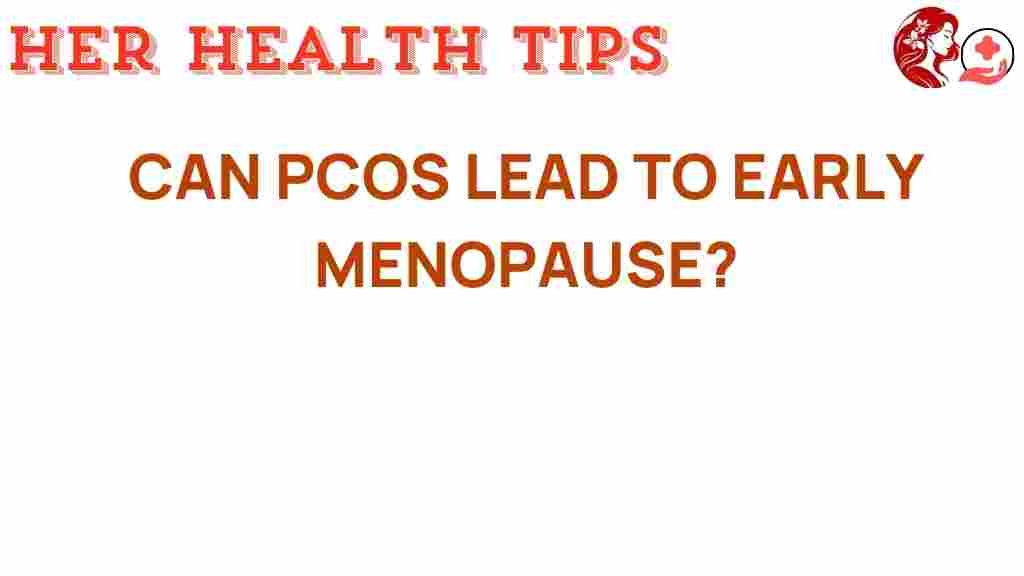Unraveling the Link: Can PCOS Accelerate the Onset of Menopause?
Polycystic ovary syndrome, commonly known as PCOS, is a hormonal disorder that affects many women during their reproductive years. As women’s health continues to evolve with new research, an important question arises: does PCOS accelerate the onset of menopause? This article will explore the connection between PCOS and menopause, focusing on hormonal imbalance, fertility, early menopause, and overall reproductive health.
Understanding PCOS
PCOS is characterized by a combination of symptoms that can include:
- Irregular menstrual cycles
- Excess androgen levels (the male hormone)
- Polycystic ovaries (enlarged ovaries with small cysts)
Women with PCOS often experience challenges related to their fertility, as the condition can lead to anovulation (lack of ovulation) and other reproductive complications. Additionally, PCOS is linked to a variety of metabolic issues, including insulin resistance, obesity, and an increased risk of type 2 diabetes.
The Symptoms of PCOS
Recognizing the symptoms of PCOS is crucial for diagnosis and management. Common symptoms include:
- Menstrual irregularities
- Weight gain
- Excessive hair growth (hirsutism)
- Acne or oily skin
- Thinning hair or hair loss
If you suspect you have symptoms of PCOS, it is important to consult with a healthcare professional for a proper diagnosis.
Diagnosis of PCOS
The diagnosis of PCOS typically involves:
- A thorough medical history review
- Physical examination
- Blood tests to check hormone levels
- Ultrasound to examine the ovaries
The diagnosis criteria often follow the Rotterdam criteria, which require two of the following three features: irregular ovulation, signs of hyperandrogenism, and polycystic ovaries.
Menopause: A Brief Overview
Menopause marks the end of a woman’s reproductive years, typically occurring between the ages of 45 and 55. It is defined as the cessation of menstrual cycles for 12 consecutive months and is accompanied by various symptoms due to hormonal changes in the body.
Symptoms of Menopause
Common symptoms experienced during menopause may include:
- Hot flashes
- Night sweats
- Vaginal dryness
- Mood swings
- Sleep disturbances
Understanding these symptoms is essential for women, particularly those with PCOS, as they may experience them differently.
How PCOS May Impact Menopause
Research suggests that women with PCOS may experience a different menopausal transition compared to those without the condition. Some of the potential links include:
1. Hormonal Imbalance
Women with PCOS often have elevated levels of androgens, which can lead to irregular menstrual cycles and anovulation. This hormonal imbalance may influence the timing of menopause. Studies indicate that women with PCOS may experience early menopause, although the exact relationship is still under investigation.
2. Early Menopause
Emerging research indicates that women with PCOS may be at an increased risk of experiencing early menopause. Factors contributing to this include:
- Chronic anovulation
- Increased insulin resistance
- Higher prevalence of metabolic syndrome
This connection underscores the importance of monitoring reproductive health in women with PCOS.
3. Fertility Implications
Fertility is often a major concern for women with PCOS. The hormonal imbalances associated with this condition can complicate conception. However, as women age and approach menopause, the focus shifts from fertility to the management of menopausal symptoms. Understanding how PCOS affects this transition is crucial.
4. Research Insights
Recent studies have explored the relationship between PCOS and menopause. For instance, a study published in the National Institutes of Health indicated that women with PCOS might enter menopause earlier than their peers. This research is vital for developing tailored healthcare strategies for women with PCOS.
5. Managing Symptoms
Women with PCOS may experience intensified menopausal symptoms due to their underlying hormonal imbalances. Effective management strategies include:
- Hormone replacement therapy (HRT)
- Regular exercise and a balanced diet
- Stress management techniques
- Regular check-ups with healthcare providers
These strategies can help alleviate symptoms and improve overall women’s health.
Step-by-Step Process for Managing PCOS and Menopause
To effectively manage the intersection of PCOS and menopause, consider the following steps:
- Consult a Healthcare Provider: Schedule regular appointments to monitor your reproductive health and hormonal levels.
- Maintain a Healthy Lifestyle: Engage in regular physical activity and eat a balanced diet to manage weight and improve insulin sensitivity.
- Stay Informed: Keep up with the latest research regarding PCOS and menopause to understand how these conditions may affect you.
- Explore Treatment Options: Discuss with your doctor the potential benefits of hormone replacement therapy or other medications to manage symptoms.
- Seek Support: Join support groups or online communities for women with PCOS to share experiences and coping strategies.
Troubleshooting Common Concerns
Some common concerns women face when navigating PCOS and menopause include:
1. Irregular Periods
If you experience irregular periods, consult your healthcare provider for potential treatment options, such as hormonal therapies.
2. Weight Management
Weight gain can exacerbate symptoms of both PCOS and menopause. Focus on a healthy diet and regular exercise to maintain a healthy weight.
3. Mood Swings
Mood swings can be challenging during both PCOS and menopause. Consider counseling or therapy and mindfulness practices to improve mental health.
Conclusion
Understanding the link between PCOS and menopause is essential for managing women’s health effectively. While more research is needed to fully understand the implications, it is clear that hormonal imbalances associated with PCOS may influence the onset of menopause and the experiences of women during this transition. Women with PCOS should remain proactive about their reproductive health, seek appropriate medical guidance, and adopt healthy lifestyle habits to enhance their quality of life during both their reproductive years and menopause.
For more information on women’s health and PCOS, you can visit WomensHealth.gov for resources and support.
This article is in the category Reproductive and created by HerHealthTips Team
